Ignition and Start Switch Replacement Pontiac
Removal Procedure
- Disconnect the negative battery cable. Refer to
Battery Negative Cable Disconnection and Connection
- Remove the instrument panel (I/P) accessory trim plate. Refer to
Instrument Panel Accessory Trim Plate Replacement
- Remove the I/P cluster. Refer to
Instrument Cluster Replacement
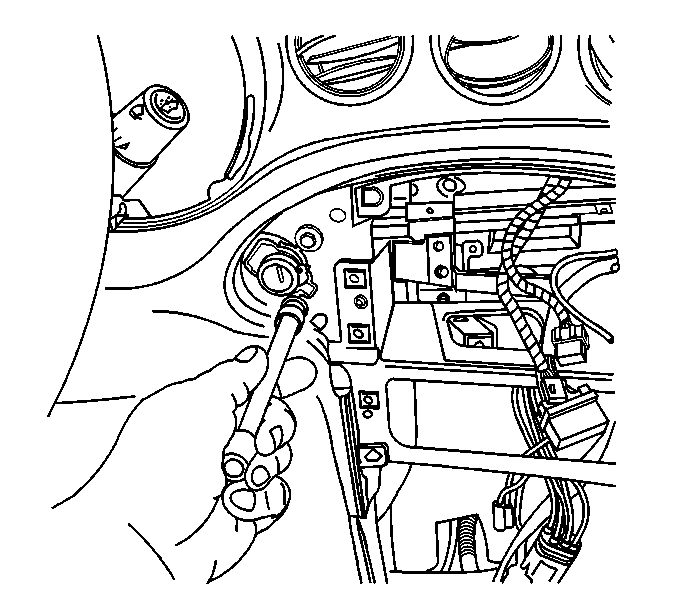
- Remove
the bolts from ignition switch.
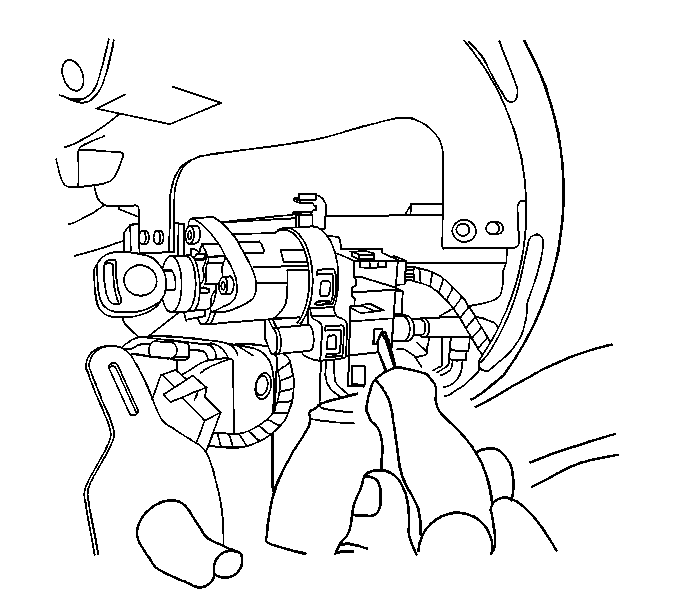
- Reposition
the ignition switch for ease of removal.
- Insert the key and turn the ignition lock cylinder to the ON/RUN position.
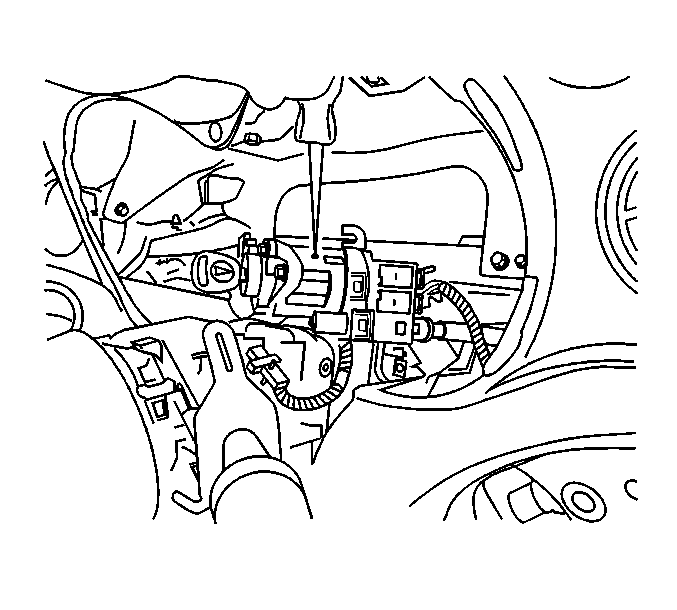
- Depress
the transaxle park/lock cable retainer to release, then pull to remove the park/lock
cable from the ignition switch.
- Perform the following procedure to remove the ignition lock cylinder from
the ignition switch:
| 8.1. | Depress and hold the ignition lock cylinder detent. |
| 8.2. | Turn the key to the ON/RUN position. |
| 8.3. | Pull the ignition lock cylinder out with the key. |
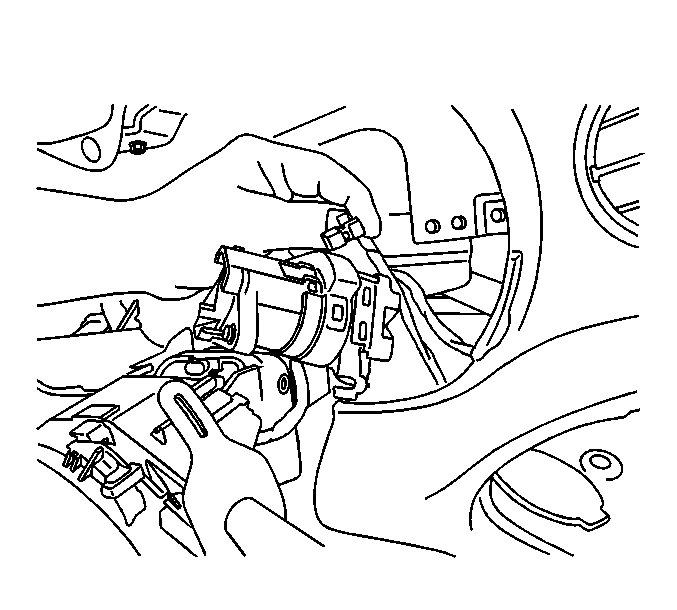
Important: Remove the ignition lock cylinder before you remove the Passlock™ electrical
connector.
- Disconnect the Passlock™ electrical connector from the ignition switch.
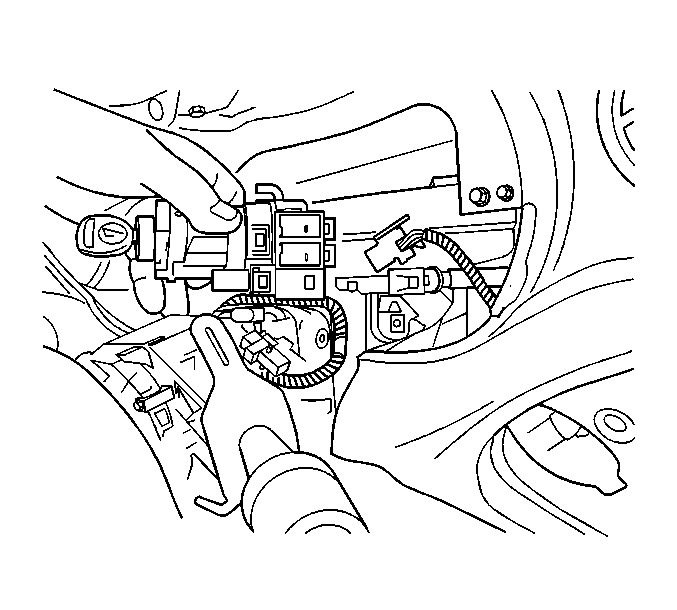
- Disconnect
the electrical connectors from the ignition switch.
- Remove the ignition switch through the I/P cluster opening.
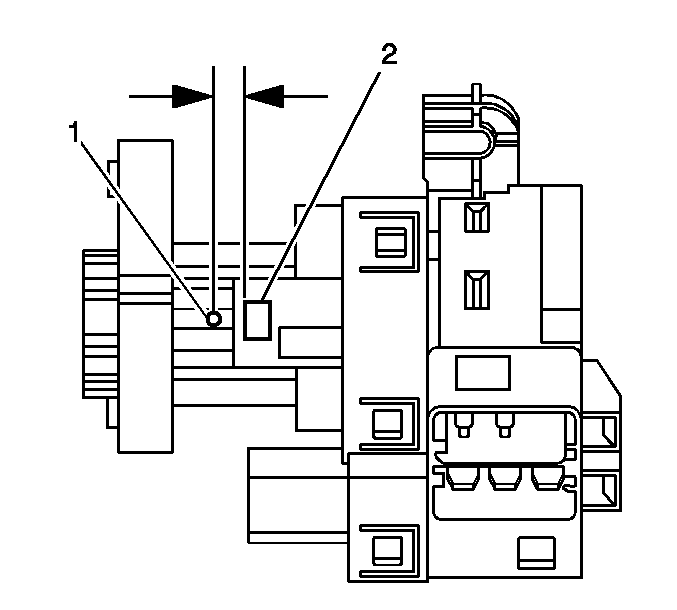
- If the lock cylinder does not rotate or
is seized, perform the following procedure:
| 12.1. | Protect the immediate work area with suitable material such as clean shop
towels or a clean fender cover. |
| 12.2. | Locate the surface for the ignition switch lock cylinder release button (2)
on the plastic ignition switch housing and center punch a location (1) on the
rib 9.5 mm (3/8 in) rearward, toward the key entry end, from the cylinder
release button. |
| 12.3. | Carefully drill a pilot hole through the plastic housing with an 1/8-inch
drill bit. |
| 12.4. | Carefully drill a larger hole at the pilot location, and slightly into
the ignition switch lock cylinder surface to break the release button retaining spring
using a 9/32-inch drill bit. |
| 12.5. | Remove portions of the broken spring from the hole using a small suitable
tool. |
| 12.6. | Grasp the ignition switch lock cylinder and remove the cylinder from the
switch housing. |
| 12.7. | Remove any plastic flashing from the drilling operation, and using compressed
air blow out the ignition switch assembly. |
Installation Procedure
- If the lock cylinder would not rotate or was seized, perform the following
procedure:
| 1.1. | Install the new ignition switch lock cylinder as required by rotating
both the cylinder and the ignition switch to the ON position. |
| 1.2. | Push the lock cylinder into the ignition switch housing until fully seated. |
| 1.3. | You may need to slightly depress the release button as the cylinder passes
by the 9/32-inch hole previously drilled in the ignition switch housing. |

- Position
the ignition switch into position through the I/P cluster opening.
- Connect the electrical connectors to the ignition switch.

- Connect
the Passlock™ electrical connector to the ignition switch.

- Connect
the park/lock cable to the ignition switch.
- Insert the key and turn the ignition lock cylinder to the ON/RUN position.
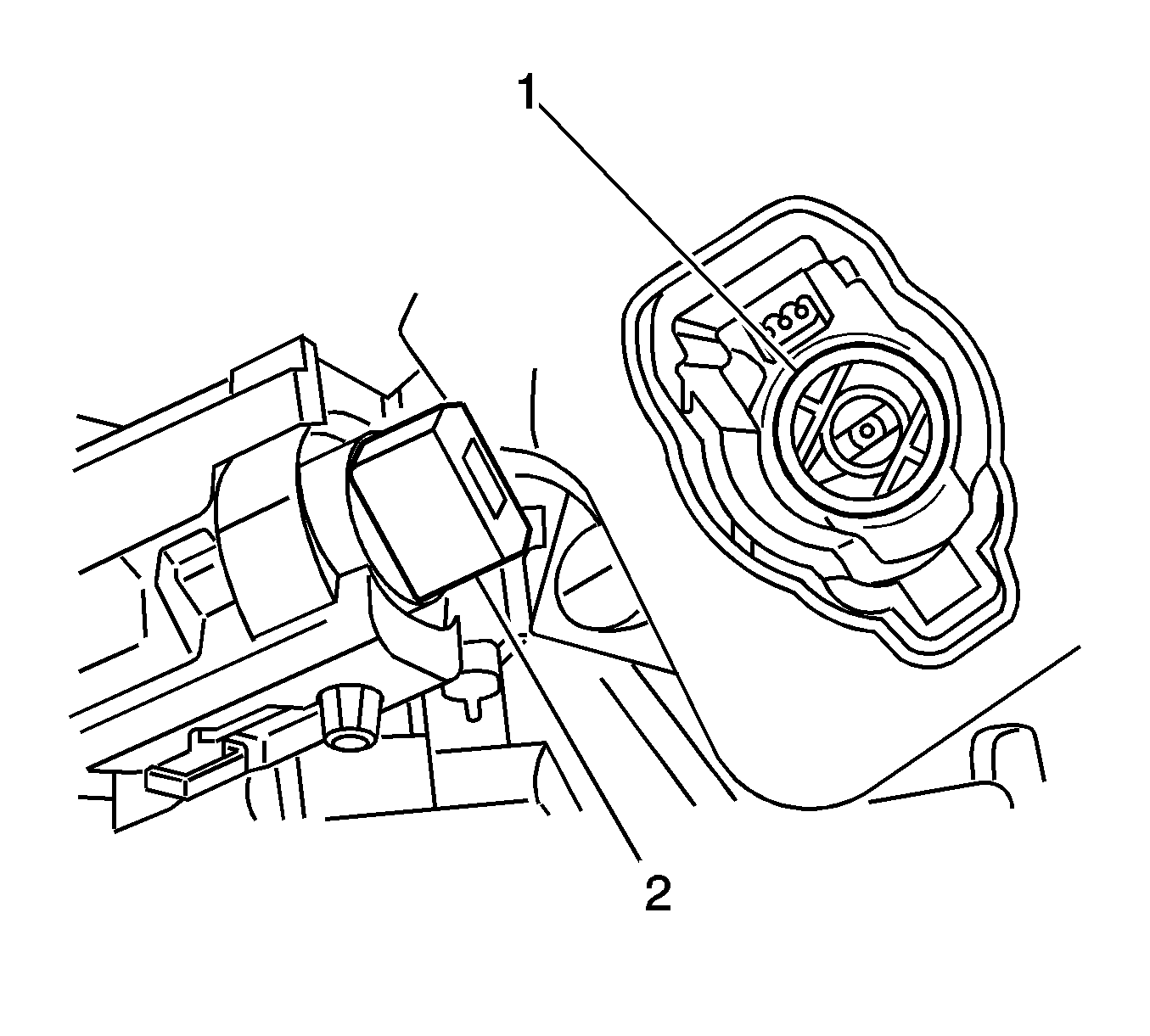
- Install the ignition lock cylinder. If you turned
the key slightly while removing the lock cylinder, you may have to align the white
colored ignition switch rotor (1) with the lock cylinder (2). You can
rotate the ignition switch rotor (1) with your finger.
- Remove the key from the lock cylinder.

- Position
the ignition switch to the I/P.
Notice: Use the correct fastener in the correct location. Replacement fasteners
must be the correct part number for that application. Fasteners requiring
replacement or fasteners requiring the use of thread locking compound or sealant
are identified in the service procedure. Do not use paints, lubricants, or
corrosion inhibitors on fasteners or fastener joint surfaces unless specified.
These coatings affect fastener torque and joint clamping force and may damage
the fastener. Use the correct tightening sequence and specifications when
installing fasteners in order to avoid damage to parts and systems.
- Install the bolts to the ignition switch.
Tighten
Tighten the bolts to 6 N·m (53 lb in).
- Install the I/P cluster. Refer to
Instrument Cluster Replacement
.
- Install the I/P accessory trim plate. Refer to
Instrument Panel Accessory Trim Plate Replacement
.
- Connect the negative battery cable. Refer to
Battery Negative Cable Disconnection and Connection
.
- Perform the Passlock™ learn procedure. Refer to
PASSLOCK Reprogramming Auto Learn
in Theft Deterrent.
Ignition and Start Switch Replacement Oldsmobile
Removal Procedure
- Disconnect the negative battery cable. Refer to
Battery Negative Cable Disconnection and Connection
in Engine Electric.
- Remove the radio. Refer to
Radio Replacement
in Entertainment.
- Remove the instrument panel (I/P) cluster. Refer to
Instrument Cluster Replacement
.
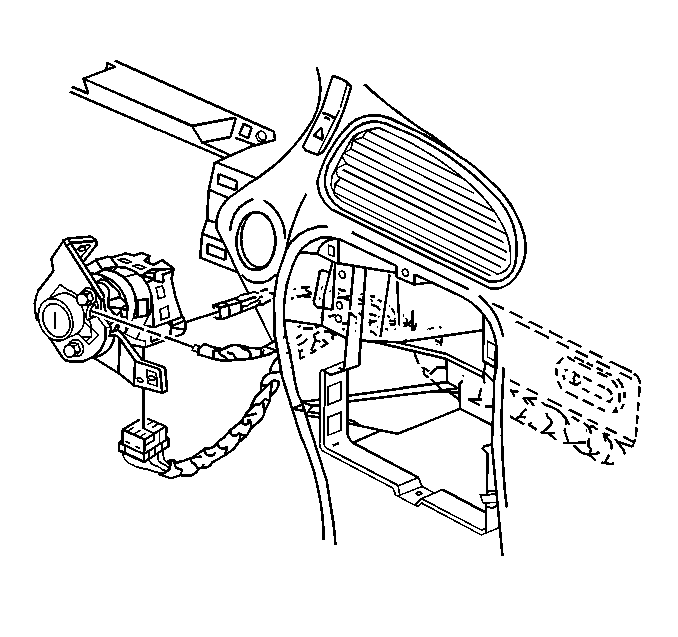
- Remove
the bolts from the ignition switch.
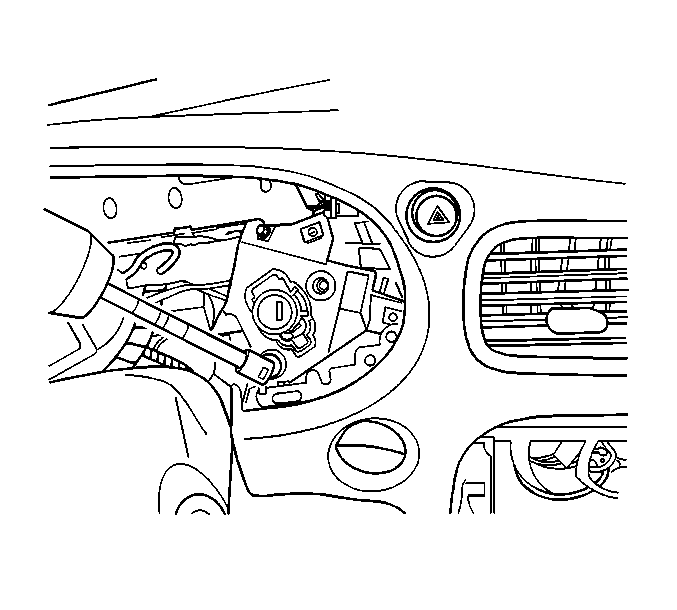
- Reposition
the ignition switch to the cluster opening for access.
- Remove the bolts which secure the ignition switch to the bracket.
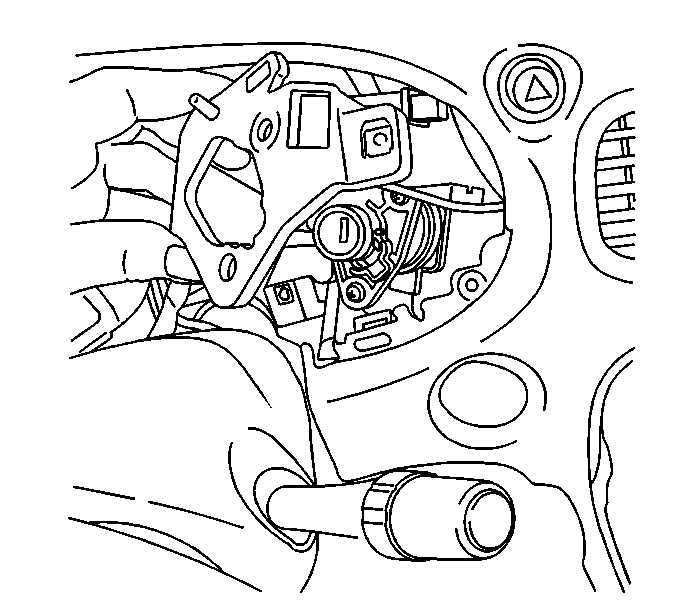
- Remove
the bracket.
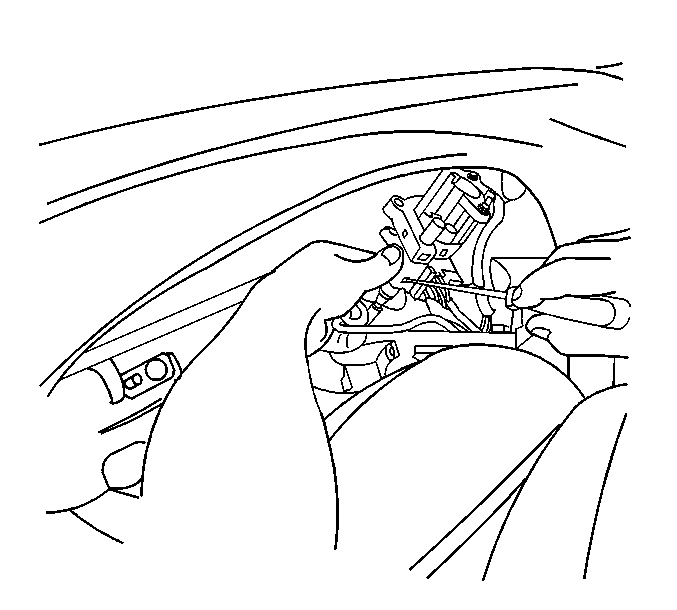
- Insert
the key and turn the lock cylinder to the ON/RUN position.
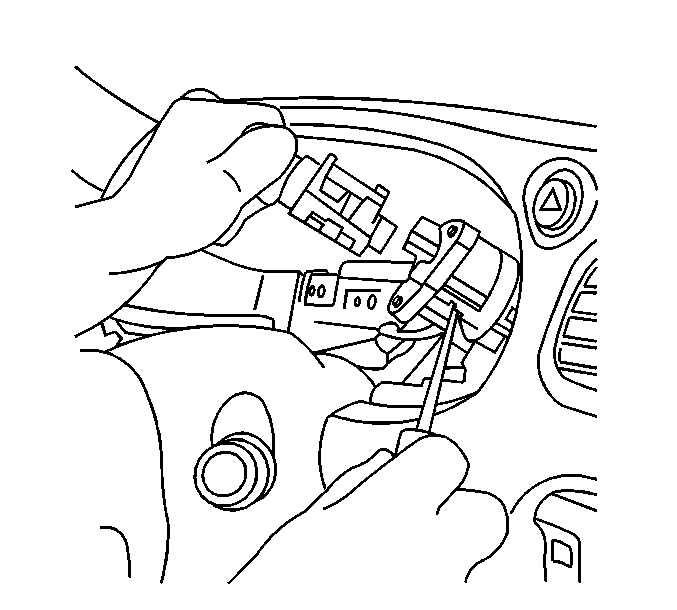
- Depress
the transaxle park/lock cable retainer to release the cable. Pull the park/lock cable
away from the ignition switch.
- Use the following procedure to remove the lock cylinder from the ignition
switch:
| 10.1. | Depress and hold the ignition lock cylinder detent. |
| 10.2. | Turn the key to the ON/RUN position. |
| 10.3. | Pull the ignition lock cylinder out with the key. |
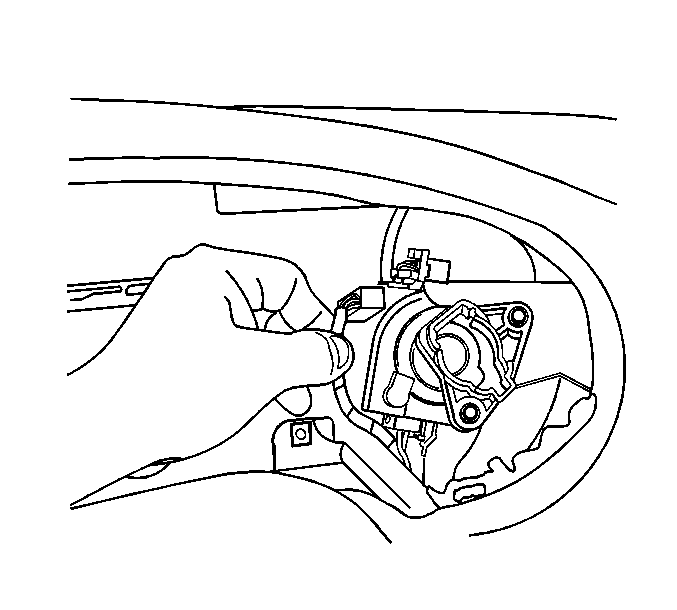
Important: Remove the lock cylinder before you remove the Passlock™ electrical connector.
- Disconnect the Passlock™ electrical connector from the ignition switch.
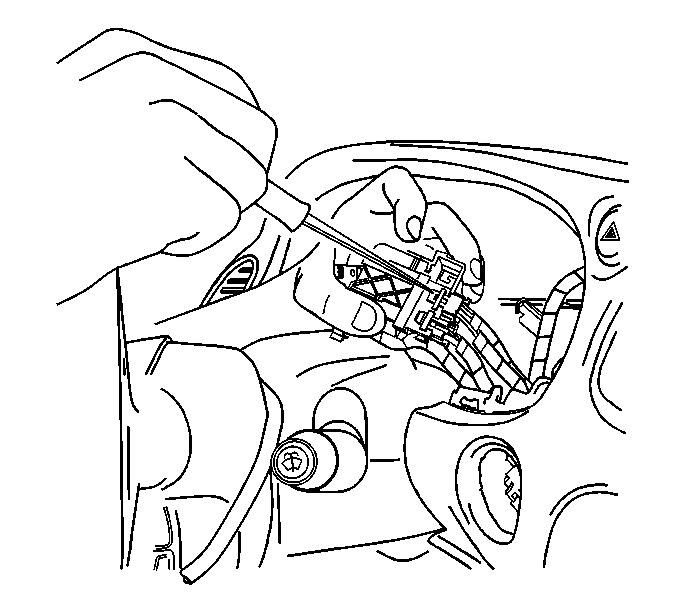
- Disconnect
the electrical connectors from the ignition switch.
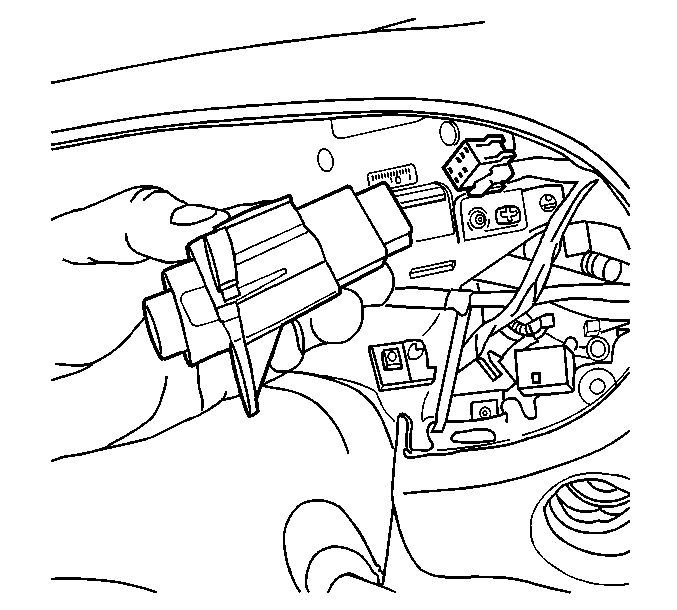
- Remove
the ignition switch through the I/P cluster opening.

- If the lock cylinder does not rotate or
is seized, perform the following procedure:
| 14.1. | Protect the immediate work area with suitable material, such as clean
shop towels or a clean fender cover. |
| 14.2. | Locate the surface for the release button (2) on the plastic ignition
switch housing, and center punch a location (1) on the rib 9.5 mm (3/8 in)
rearward, toward the key entry end, from the cylinder release button. |
| 14.3. | Use an 1/8-inch drill bit and carefully drill a pilot hole through the
plastic housing. |
| 14.4. | Use a 9/32-inch drill bit and carefully drill a larger hole at the pilot
location, slightly into the lock cylinder surface, to break the release button retaining
spring. |
| 14.5. | Remove portions of the broken spring from the hole using a small suitable
tool. |
| 14.6. | Grasp the lock cylinder and remove the cylinder from the switch housing. |
| 14.7. | Remove any plastic flashing from the drilling operation, and using compressed
air, blow out the ignition switch assembly. |
Installation Procedure
- If the lock cylinder would not rotate or was seized, perform the following
procedure:
| 1.1. | Install the new lock cylinder as required by rotating both the cylinder
and the ignition switch to the ON/RUN position. |
| 1.2. | Push the lock cylinder into the ignition switch housing until the cylinder
is fully seated. |
| 1.3. | Slightly depress the release button as the cylinder passes by the 9/32-inch
hole previously drilled in the ignition switch housing. |
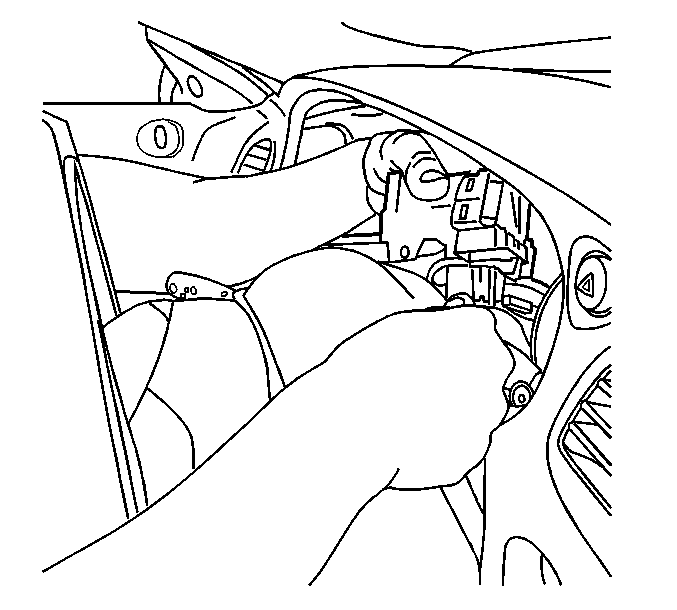
- Position
the ignition switch into position through the I/P cluster opening.
- Connect the electrical connectors to the ignition switch.

- Connect
the Passlock™ electrical connector to the ignition switch.
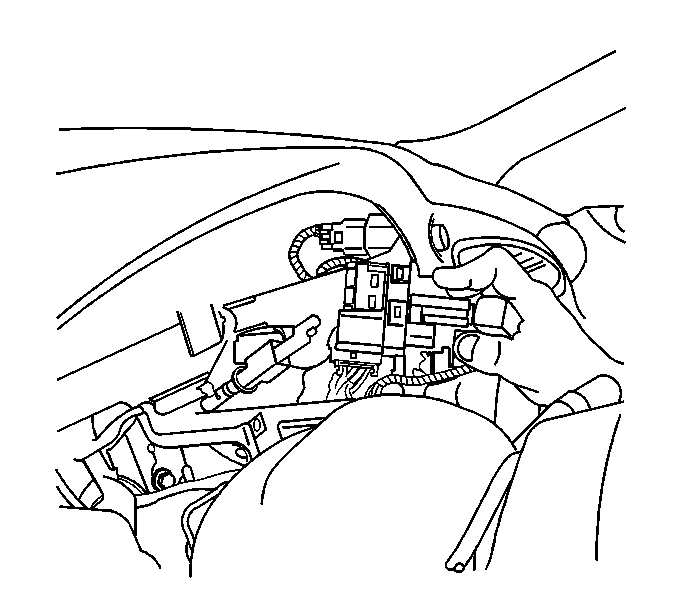
- Connect
the park/lock cable to the ignition switch.

- Position
the bracket to the ignition switch.

Notice: Use the correct fastener in the correct location. Replacement fasteners
must be the correct part number for that application. Fasteners requiring
replacement or fasteners requiring the use of thread locking compound or sealant
are identified in the service procedure. Do not use paints, lubricants, or
corrosion inhibitors on fasteners or fastener joint surfaces unless specified.
These coatings affect fastener torque and joint clamping force and may damage
the fastener. Use the correct tightening sequence and specifications when
installing fasteners in order to avoid damage to parts and systems.
- Install the bolts to the ignition switch bracket.
Tighten
Tighten the bolts to 6 N·m (53 lb in).
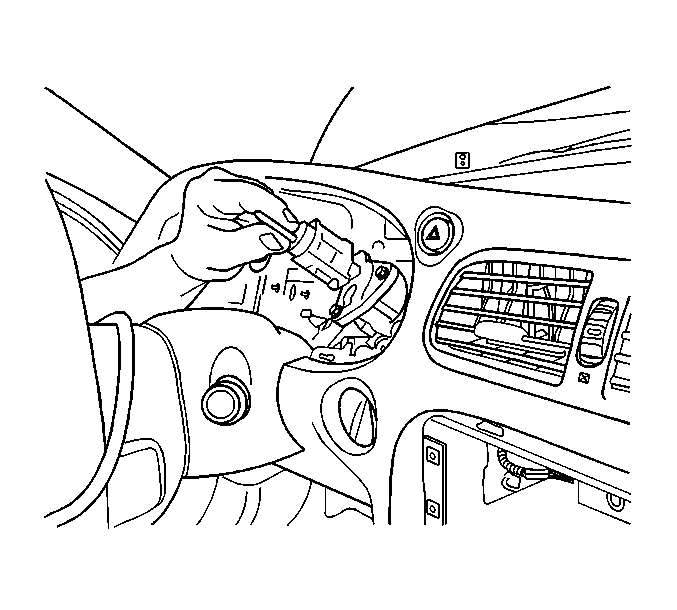
- Insert
the key and turn the lock cylinder to the ON/RUN position.
- Install the ignition lock cylinder into the ignition switch.

- If you turned the key slightly while removing
the lock cylinder, you may have to align the white colored ignition switch rotor (1)
with the lock cylinder (2). You can rotate the ignition switch rotor (1)
with your finger.
- Remove the key from the lock cylinder.

- Position
the ignition switch to the switch opening.
- Install the bolts to the ignition switch.
Tighten
Tighten the bolts to 6 N·m (53 lb in).
- Install the I/P cluster. Refer to
Instrument Cluster Replacement
.
- Connect the negative battery cable. Refer to
Battery Negative Cable Disconnection and Connection
in Engine Electrical.
- Perform the Passlock™ learn procedure. Refer to
PASSLOCK Reprogramming Auto Learn
in Theft Deterrent.




























